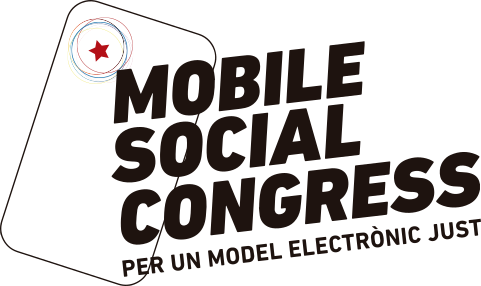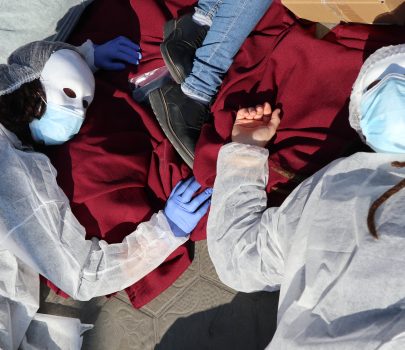The 5th edition of the Mobile Social Congress (MSC) started with a street action held in Barcelona’s Plaça Catalunya. Activists from SETEM Catalunya, the organizer of the MSC, denounced the arrogance of the giants of the mobile phone industry. They exposed the exploitation suffered by those working in the sector (mandatory overtime, salaries below the minimum wage, denial of the right to association and organization, child labour, low job security…). The action also protested the significant environmental consequences of extracting the minerals needed for electronic devices.
Over the course of two days, a number of debates and activities will be held on the social and environmental impacts of the tech industry. On Tuesday, the focus will be on gender inequality, with a look at violations of job security, workers’ health and labour rights. We will also hear from those working in the electronics supply chain, and look at the synergies existing between labour unions and associations in both the Global North and Global South. Meanwhile, we will hold a workshop on Urban Mining and a Restart Party (both will require prior registration). In the workshop, we will learn about the different elements that make up our mobile phones, where they come from and how to recycle them. At the Restart Party, we will learn how to lengthen the lives of our electronic devices.
On Wednesday we will discuss the power of socially responsible public procurement in addressing gender inequalities in the electronics supply chain, and we will look at the criteria for best practice followed by different administrations. Furthermore, we will analyse the social and environmental impacts of the extractive industry on a global scale, with a focus on working conditions in Bolivian mines. This discussion will include the presence of Terry Collingsworth, who has presented a lawsuit against the giants of the tech industry for human rights abuses and crimes in mines in the Democratic Republic of the Congo (DRC). These mines extract cobalt and gold, essential minerals for the mobile phone industry. The potentially historic lawsuit targets Apple, Google, Tesla, Microsoft and Dell, accusing them of using forced child labour and of being responsible for the murder and injury of children.
MSC2020 will focus on human rights violations and the environmental impacts of the electronics industry’s model of production and consumption in both the Global North and South. It will also look at the two-way dialogue between workers’ unions and associations pushing for a new model based on human beings.
SETEM Catalunya will once again invest in a space where citizens can come together and reflect on the current model of production and consumption for information and communication technologies. This model generates serious human rights violations—especially regarding worker’s rights—and environmental consequences that are hidden at the Mobile World Congress.
At MSC2020, we invest in technological sovereignty and fair electronics!


